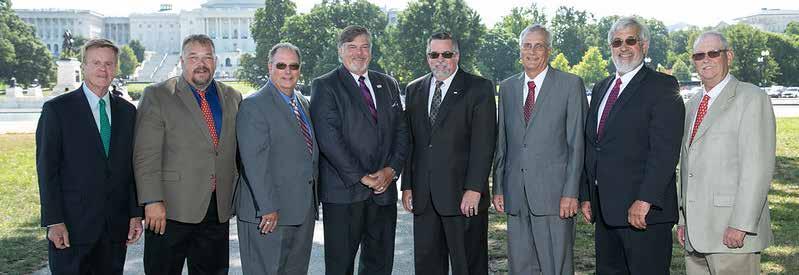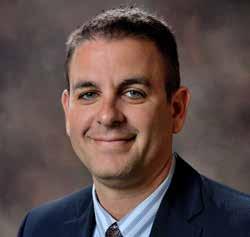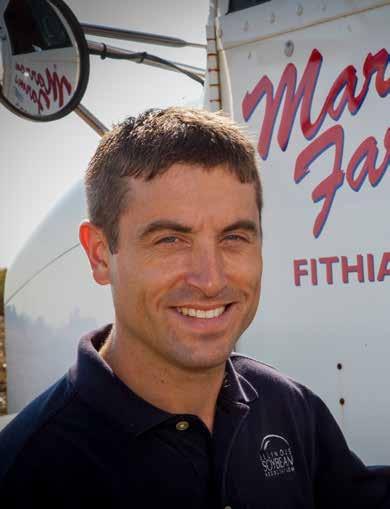
11 minute read
Finding your voice for soy
Working together to make lawmakers into educated ag advocates
Illinois Soybean Association Government Relations Committee Chair, Ron Kindred, takes stock of Illinois soybean farmers' opportunities despite pandemic challenges.
Advertisement
By DeAnna Thomas
COVID-19 has brought a myriad of challenges and opportunities for Illinois soybean farmers and the agriculture industry. From social distancing to sheltering in place and more, the last eight months have made Illinoisans pause, and forced farmers to adapt when it comes to connecting, communicating, and educating both constituents and consumers. Without exception, annual in-person visits with legislators to discuss agriculture policy on the Hill and in Springfield has halted. Still, the voice of Illinois soybean farmers is heard loud and clear.
“Serving the Illinois Soybean Association since 1999, I have really enjoyed being involved and being in the know when it comes to agriculture policy,” said Illinois Soybean Association (ISA) Government Relations Committee Chair Ron Kindred. “I have witnessed how much of a difference it makes when we lobby in Springfield and Washington D.C. It is vitally important, now more than ever, we let our legislators know how policies and regulations impact farmers and our industry, and cannot be underestimated.”
ISA’s Voice for Soy action center is the advocacy arm for Illinois soybean farmers and supporters of agriculture which puts subscribers into direct contact with lawmakers. It allows constituents a voice in the legislative and regulatory process to ensure the needs of Illinois soybean farmers are met.
“One thing that has never gone away, and hopefully never will, is the importance of constituent voices in Washington and Springfield,” said Andrew Larson, ISA’s Director of Public Policy and Market Development. “Legislators always want to hear from people affected by the legislation they are voting on. They appreciate that feedback and want to know the impact of the public policy and laws they are being asked to create and how it is perceived by the people.”
Advocating Starts with You
While the changing landscape has brought about uncertainty, Voice for Soy remains a constant and efficient way for farmers to contact elected officials. By registering with Voice for Soy, farmers are armed with information on the most current legislative issues and equipped to take immediate action.
“We know, in a situation like putting together a farm bill in Washington, it is critically important to share the vision and needs of Illinois soybean farmers with our elected officials through our advocacy system – not just when the vote happens, but beforehand so they can take that information to their colleagues and committee meetings to advocate and say, ‘Here is what Illinois farmers would like to see changed or added to this piece of legislation,’” Larson said. “We know many of our legislators are ready and willing to advocate on our behalf
and having our Voice for Soy network, which is full of constituents ready to share their thoughts and feedback in a massive way in response to our calls for action, is that much more important.”
Something to Be Proud Of
“Over the years, I have witnessed China being accepted into the World Trade Organization, and collaborate with the Illinois Corn Growers to help unanimously pass a biodiesel and ethanol tax incentive and more,” said ISA Director Kindred. “It is amazing for the small percentage of the population farmers are, how much of an impact we truly have in Springfield and in Washington D.C. We can be extremely successful, but we can’t just sit around and expect somebody else to do it for us. We have to advocate for ourselves, and Voice for Soy has proven to be a very successful resource tool for us to do so."
Larson feels there are specifically two areas of legislation on which Illinois farmers need to keep their eyes: biodiesel and the upcoming farm bill. Biodiesel is an issue which is continually important to soybean farmers because most of the biodiesel made in the United States is made from soybean oil. By supporting the biodiesel industry, it creates a strong marketplace, strengthening the price of soybean oil and overall soybean prices. The Voice for Soy network has been engaged in Springfield regarding the state sales tax exemption for biodiesel blends over 11-percent, and has kept the attention of legislators in Washington regarding the federal biodiesel tax credit.
Voice for Soy also gives farmers a leg-up when it comes to farm policy. According to Larson, it is critically important for legislators, who shape what the future of farm policy looks like to hear directly from farmers about how programs like crop insurance are impacting them in the countryside.
“Some farmers used crop insurance for the first time in 2019 and 2020,” Larson said. “By sharing the story of how beneficial the crop insurance renewal act was for their operations, we have the opportunity to make a difference by preserving and protecting the crop insurance program for future generations.”
After serving more than 20 years on the ISA board, Kindred said engaging with younger and new members within ISA is key to continuing the organization’s tradition of successful outreach with elected officials.
“We are beginning to transition to the next generation on my own family farming operation, so I understand the dynamics and importance of sharing my experiences and opportunities. They are good at a lot of things I am not good at, and I think I am good at some of the things they are not very good at yet. So, if we can get together and share those experiences, we will be a better organization and shape better policy for future generations. It is our role to serve as mentors to help our younger generations make an impact and be successful both on the farm and in serving the ISA members.”
“By becoming involved in organizations like Illinois Soybean Association and the American Soybean Association, the experiences I have had have been extremely rewarding,” Kindred said. “It is a humbling and tremendous experience to be able to speak to national and international audiences on behalf of Illinois and American soybean farmers. I hope people who knew me 20 years ago and still know me today have watched me grow as a person and as a leader. I hope our future generations start to become more involved and it can start by signing up for Voice for Soy.”
Text SOY to 52886
How It Works
Signing up for the Voice for Soy advocacy network is simple. Using a smartphone, members should text 'SOY' to 52886. Members will then be prompted to complete their profile registration.
With a valid address, Voice for Soy can locate members’ respective state and federal legislators. When an action request comes through the network, a pre-written email within the action center is ready for members to send. If it is a phone call action request, the action center provides the phone numbers to call respective legislators. It is an all-in-one, easy-to-use process which takes less than a minute.
Voice for Soy is not limited to ISA members. Working together with other farmers and farm groups on common issues amplifies agriculture’s voice. Members may invite fellow farmers, family, and friends to join as advocates, too. Please reach out to ISA’s Director of Public Policy and Market Development, Andrew Larson at larsona@ilsoy.org or call 309-808-3612 with questions about signing up or to become more involved in ISA’s legislative outreach.

Illinois' eight American Soybean Association representatives are proud to advocate for soybean issues on the hill. Pictured from left are Jered Hooker, Rob Shaffer, Daryl Cates, Stan Born, Bill Wykes, Ron Moore, Bill Raben, and David Droste.
The Illinois biofuel movement
Championing for our environment, economy, and our health
Growing biofuels doesn’t pose a singular win for Illinois. Rather it poses a triple-win for the state’s environment, economic and social advantages, and the collective health of our families, neighbors, and citizens. That’s why the Voice for Soy program is driving several important legislative conversations: our Illinois farmers represent homegrown solutions for today’s global issues.
Here’s some backstory on this powerhouse movement.
Biofuel is a greenhouse gas reducing, advanced resource that is not only sustainable, it’s a more environmentally-friendly, cleaner-burning option that can be used without modification. Biofuels help to enhance and safeguard energy security by reducing the world's reliance on fossil energy sources.
As our global population continues to grow, with it will come substantially increasing energy consumption. Biofuel resources are the natural answer to growing demands. And this self-sustaining product is born, right here, in soybean fields across Illinois. Environmentally speaking, biofuel decreases greenhouse gas emissions by up to 86 percent, and reduces smog, wastewater, and hazardous waste, all while boasting the highest energy balance of any U.S. fuel. Since 2007, the use of biodiesel prevented 24.3 million metric tons of carbon emissions, which is the equivalent of removing 5.3 million cars from Illinois’ roadways. And because biofuels reduce greenhouse emissions, new research suggests this fast-evolving resource will positively impact climate change.
But its benefits don’t end with the environment. Enter big-time economic advantage.
The total economic impact of the Illinois ethanol industry teeters around $10.2 billion, giving way to more than 32,200 Illinois jobs represented by the ethanol and corn industries. The biodiesel industry alone accounts for 7,200 jobs and $3 billion to the Illinois gross domestic product (GDP).
Additionally, biofuels provide affordable vehicle purchase options and minimize fuel cost, all bolstering the standard of living for Illinois families of every socio-economic status.
But to be considered a meaningful resource, biofuels cannot only offer superior environmental benefits, economic advantage, and social leverage, they must deliver sustainable solutions that positively impact human health. In the wake of COVID-19, our country is waking up to a new appreciation for respiratory health and lung capacity. We know healthy respiratory function is our best defense against COVID-19 and many other illnesses including asthma and certain cancers.
Biofuels discharge fewer toxins into the air, reducing the risk of respiratory disease in children and adults. A healthy environment and healthy economy sit pale beside a healthy humanity.
Illinois Soybean Association and our ag industry counterparts are leading the conversation about increasing Illinois use of biofuels through a clean energy strategy, policy changes that will impact our statewide production capability, and the development of education and job placement opportunities in communities disproportionately affected by pollutants from vehicle emissions.
Reducing waste where we can, making the most of our valuable natural resources, and ensuring the health and safety of future generations are goals we’re all called to care about.
Join the conversation! Email us at ilsoy@ilsoy.org and visit VoiceforSoy.org for additional information.


MIKE LEVIN Senior Director of Government Affairs Illinois Soybean Association
Telling our stories

RACHEL PEABODY Editor Illinois Soybean Association
Back in 2005, a young, ambitious Taylorville High School graduate picked Ag Communications as her intended career path. She knew not a person in the field. She just knew she liked to write and speak, and she was inspired by the farmers she knew and their stories. She was born and raised in FFA’s national blue and corn gold colors, and her roots and passion for agriculture ran deep. Fast forward 15 years, and that girl is the Editor of the relaunched Illinois Field & Bean – a publication you hold in your hands today.
That’s my story, and I know you have one, too.
This is the first issue of the new Illinois Field & Bean. We’ve turned the page of our association so to speak, so it only made sense our publication evolved with our approach, too.
What is that new approach? It’s a refocus of our organization’s priorities, putting the Illinois soybean farmer back in the bullseye of all we do. Think of it as our opportunity to rewrite the farmer back into the story – and in the pages of this issue and every Illinois Field & Bean to follow – that’s just what we intend to do.
We know every Illinois farmer has a story, and we plan to tell those stories. With each issue, we hope to meet our farmers where they are with information that makes you feel more informed, knowledgeable and competitive in the current soybean market. Through checkoff and non-checkoff topics, we’ll share stories that matter. We encourage you to send us story ideas of your own to ilsoy@ilsoy.org.
When planning this issue, we picked topics that get back to the heart of it all. I think you will enjoy reading about Illinois farmer leader Mike Marron, a Vermillion Co. native, and how his day job helps soybean farmers around the state (page 10). There’s a feature on the latest cover crops, and how farmers can customize blends for their production systems (page 18). And, I think you will enjoy our cover story on homegrown biodiesel, talking about a soybean farmer and his journey with soy-based biodiesel blends on his farm in a true “I grow it, I use it” kind of fashion (page 14).
Here’s to the first issue of the new Illinois Field & Bean. This magazine is for every soybean farmer in this state that contributes to Illinois being the No. 1 soybean producing state in the country. It’s for every single person from the researcher, to the processor, to the educator that makes the soybean industry go round. It’s for the Mt. Auburn, Ill., farmers who contributed in my upbringing and who gave me so many great stories and a desire to tell them.
Please enjoy this first issue of the relaunched Illinois Field & Bean, and join us in eager anticipation of every one that follows.
Now let’s tell some stories.









